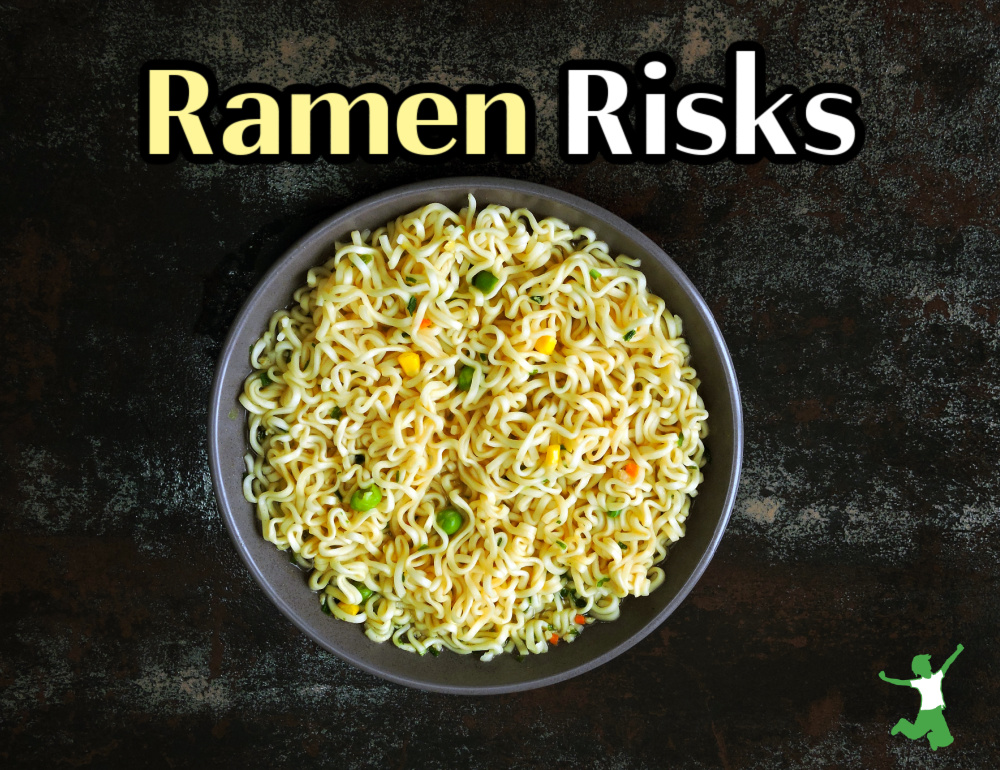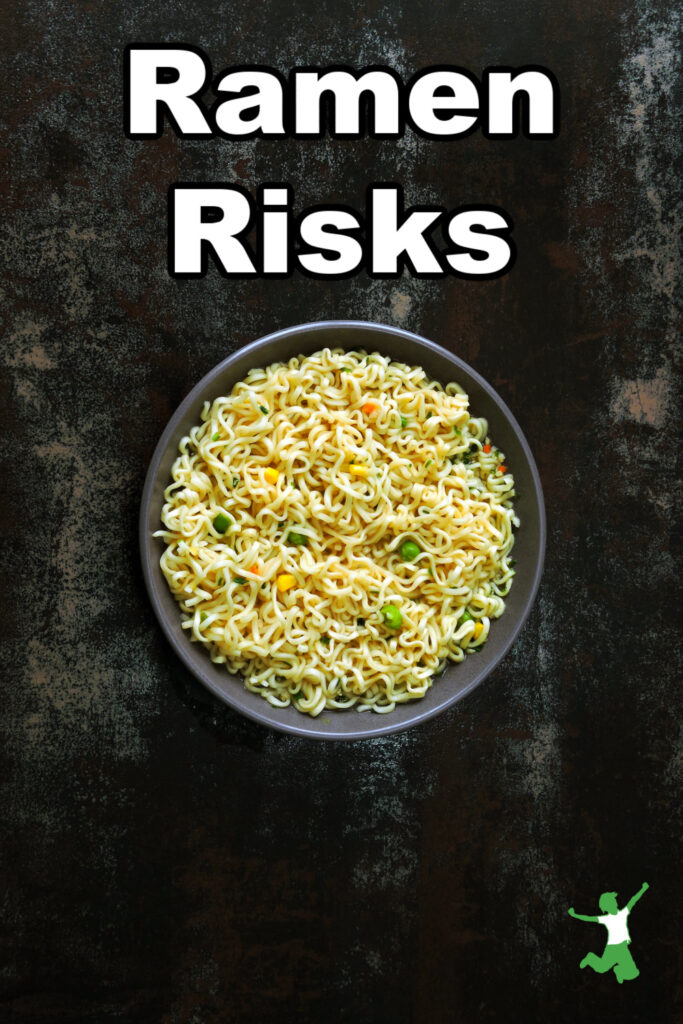Research on the health risks of eating ramen noodles regularly. Even organic or gluten-free versions are best avoided as they contribute to metabolic syndrome, especially in women.

Like many other poor college students, ramen noodles were a primary line item in my bare-bones food budget.
Gross at it sounds to me now, I typically ate ramen 3-4 times per week.
At 10 cents per meal, the price was definitely right.
The high amount of synthetically derived monosodium glutamate (MSG) in ramen noodles tasted so good.
It tantalized my tastebuds and fooled my body into thinking it was getting nourishment.
The sad truth is that it was getting nothing but empty calories, chemicals, and additives.
Ramen Risks
Large studies involving over 10,000 people warn of the dangers of ramen noodles, especially for women, which go far and beyond the metabolism disrupting, hypothalamus frying MSG.
In fact, some of the dangers associated with ramen noodles have nothing to do with the noodles themselves.
This means organic ramen noodles eaters are at risk too.
Scientific Research
The findings published in the peer-reviewed Journal of Nutrition warned that those who consume ramen noodles as little as two times per week are at skyrocketing odds of developing metabolic syndrome with its host of prominent symptoms: obesity (particularly abdominal), diabetes, heart disease, and stroke. (1)
Women suffer from especially elevated risk.
The study bolsters previous research on rats which showed that MSG consumption caused blindness and obesity and studies on mice that demonstrated that MSG intake caused brain lesions on the hypothalamus. (2)
Ramen noodle consumption is high among Asian populations.
Consequently, the research of Dr. Hyun Joon Shin MD, a clinical cardiology fellow at Baylor University in Texas and a nutrition epidemiology doctoral student at the Harvard School of Public Health, focused primarily on South Korea.
In this area of the world, people consume the highest per-capita number of instant noodle eaters.
A total of 10,711 adults (54.5% women) ages 19-64 years of age were analyzed, with adjustment for sampling design complexity.
The diet of the study participants was assessed by using a 63-item food-frequency questionnaire.
Researchers identified 2 major dietary patterns:
- “Traditional dietary pattern”. High in rice, fish, vegetables, fruit, and potatoes.
- “Fast-food pattern”. Frequent consumption of soda, fried food, and fast food including instant noodles.
Health Dangers
South Koreans have suffered from a rapid increase in health problems in recent years, specifically heart disease and overweight adults. Dr. Shin said:
While instant noodle intake is greater in Asian communities, the association between instant noodle consumption and metabolic syndrome has not been widely studied. I decided to investigate in order to uncover more distinct connections. (3)
Dr. Shin’s findings did indeed uncover a disturbing association between eating instant noodles two or more times a week and the development of cardiometabolic syndrome.
This condition raises a person’s likelihood, particularly in biological females, of developing heart disease and other conditions, such as diabetes and stroke. (4, 5)
Dr. Shin noted that the gender variations in consuming ramen noodles are likely due to biological differences. This would include hormones as well as metabolism.
The gender gap may also partly be caused by the different eating habits between men and women as well as potential variation in the accuracy of food reporting.
BPA in Instant Noodles Packaging
Another potential factor in the gender difference is a chemical called bisphenol A (BPA), which is used for packaging some ramen noodles brands.
Studies have shown that BPA is an estrogen mimicker and endocrine disruptor as it interferes with hormone messaging within the body.
BPA-free packaging is likely no safeguard. Cousin chemicals such as BPS have the same and perhaps even worse hormone-disrupting effects. (6)
Dr. Shin is hopeful that the positive impact of the study on consumers can be substantial considering the popularity of ramen noodles and other instant noodle products.
He also said it highlights the importance of understanding the effects of what we feed our bodies:
This research is significant since many people are consuming instant noodles without knowing possible health risks. My hope is that this study can lay a foundation for future research about the health effects of instant noodle consumption. (7)
Do you eat ramen noodles or other instant noodle style products? Will you potentially change your consumption of these products based on this research?
What about popular Ramen style restaurants that have popped up in recent years? I personally avoid those establishments just like instant noodles from stores.
Frying in Rancid Oils
Perhaps the biggest problem with ramen and instant noodles, in general, is that they are pre-cooked in rancid vegetable oils.
This is why ramen is so quick to prepare…commonly by just adding some boiling water!
Why isn’t the frying oil listed in the ingredients? The reason is because the practice is “industry standard” which allows manufacturers to hide it from the consumer.
To examine this for yourself, compare the fat content of regular wheat noodles to instant ramen. The ramen mysteriously has a higher fat content yet no oils appear in the ingredients.
Gluten-free ramen is the same. Regular rice noodles have nearly zero fat per serving, yet the rice noodle ramen has roughly 2 grams of fat per serving.
Where did the small amount of fat come from? The fat content is from frying the noodles in some type of industrialized vegetable oil before packaging.
Healthy Alternatives
If you wish to enjoy ramen noodles that are healthy, this recipe for ramen soup could be just what you are looking for as an alternative to unhealthy versions from the store.
My version uses plain rice noodles instead of fried instant noodles.
Unfortunately, I have yet to come across a brand of commercial ramen noodles that I can suggest as safe.
This includes organic and/or gluten-free brands, which still have toxic packaging issues and are fried in rancid oils which is what makes the product so conveniently “instant”.
(1, 3-4, 7) Instant noodle intake and dietary patterns associated with distinct cardiometabolic risk factors
(2) Dirty Secrets of the Food Processing Industry
(5) Mayo Clinic: Metabolic Syndrome
(6) BPA-free containers are just as hazardous
More Information
Headaches? A Most Likely Cause
Chicken Broth “No MSG” Labels are False









p.s. excellent replacement for Top Ramen seasoning packet: Redmond’s Seasons Salt – it tastes exactly like it and has that golden yellow color, too.
I ate Top Ramen at least 4 times a week in my 20’s. I have tried any healthier version of ramen I could find over the years and they have all tasted like air. A few days ago, a miracle…I finally found some healthy enough delicious instant ramen noodles. I cooked the noodles in some homemade chicken broth. Wonderful memories of slurping down that comforting ramen soup overwhelmed my joyful heart and dancing taste buds!